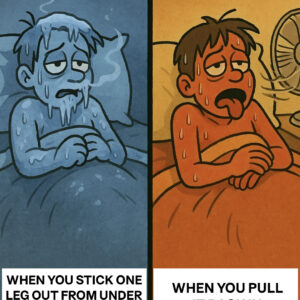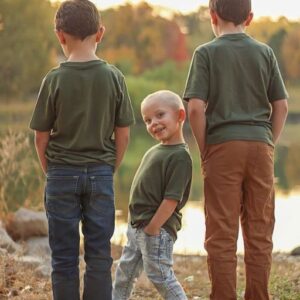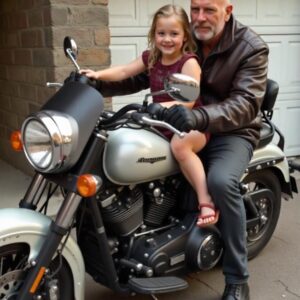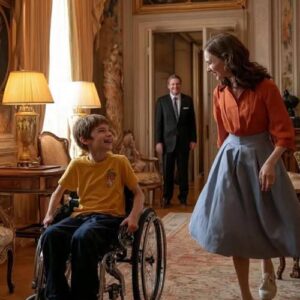
The day after I lost my parents, I grew up fast. Not because I hit eighteen, but because someone tried to take my only family left—my little brother, Max. And I wasn’t going to let that happen.
At just eighteen, I never thought I’d face the toughest time of my life—losing both my parents and looking after my six-year-old brother, Max, who still believed Mom was just away for a while.
To make things harder, their funeral was on my birthday.
People said “Happy 18th” like it was a big deal.
It wasn’t.
I didn’t care about cake or presents. I just wanted Max to stop asking, “When’s Mom coming back?”
Still wearing our black clothes, I knelt by their resting place and made a promise to Max: “No one’s taking you away. Not ever.”
But not everyone was okay with that.
“It’s better this way, Ryan,” Aunt Diane said a week later, her voice full of fake worry as she gave me a cup of hot chocolate I didn’t want. She and Uncle Gary had us over after the funeral. We sat at their spotless kitchen table. Max played with his dinosaur stickers while they looked at me with fake sad faces.
“You’re still young,” Diane said, touching my arm like we were buddies. “You don’t have a job. You’re still in school. Max needs a steady life, someone to guide him… a real home.”
“A proper home,” Uncle Gary chimed in, like they’d practiced it.
I stared at them, clenching my jaw so hard it hurt. These were the same people who forgot Max’s birthday three years straight. The same ones who skipped Thanksgiving for a “vacation.”
And now they wanted to act like parents?
The next day, I learned they’d filed for custody. That’s when it clicked—this wasn’t about caring.
It was a plan. Deep down, I felt something was off. Diane didn’t want Max because she loved him.
She wanted something else.
And I was going to find out what. I wasn’t letting them win.
The day after Diane filed for custody, I walked into the college office and quit school. They asked if I was sure. I said yes before they could finish. School could wait—Max couldn’t.
I took two jobs. By day, I delivered food, smiling no matter how rude people were. By night, I cleaned law offices—funny, since I was preparing for my own legal fight.
We left our family house—it cost too much. Max and I moved into a tiny apartment that smelled like cleaning spray and old food. The bed touched one wall, the couch the other. But Max still smiled.
“This place is small but cozy,” he said one night, wrapped in a blanket like a taco. “It smells like pizza… and home.”
Those words nearly broke me. But they also pushed me forward. I filed for legal guardianship. I knew I was young. I knew it was tough. But Max needed me, and that had to matter.
Then everything went wrong one morning.
“She’s lying.” I stood still in the living room, holding a Child Services report in my hands.
“What did she say?” I whispered, my voice empty.
The social worker avoided my eyes. “She says you leave Max alone. That you yell at him. That you’ve hurt him… more than once.”
I couldn’t speak or think. All I saw was Max’s face—his giggle when I made funny voices, how he snuggled close during storms. I’d never hurt him.
But Diane had spread doubt. And doubt can ruin everything.
She didn’t expect Ms. Harper—our neighbor, a retired teacher who watched Max during my long work hours. She walked into court like she owned it, holding a folder and wearing a pearl necklace that shone like a shield.
“That young man,” she said, pointing at me, “cares for his brother with more love than most parents give in a lifetime.”
Then she looked at the judge, eyes sharp, and said, “I’d like anyone to prove me wrong.”
Winning in court was hard, but Ms. Harper’s words gave us a chance. The judge put off deciding custody and gave Diane supervised visits instead. It wasn’t a complete win, but it let me breathe.
Every Wednesday and Saturday, I took Max to Diane’s. It made me sick every time, but the court said I had to, and I didn’t want to give them a reason to doubt me.
One Wednesday evening, I got there a bit early. The house was too quiet. Diane opened the door with her usual fake smile.
Max ran to me, his face red, tears on his cheeks.
“She said if I don’t call her Mommy, I can’t have dessert,” he whispered, grabbing my jacket like it was his lifeline.
I knelt down, smoothing his hair. “You only call Mom ‘Mommy,’” I told him. He nodded, but his lip shook.
That night, after tucking Max in, I took the trash out. I didn’t mean to listen in. But as I passed Diane’s kitchen window, I heard her voice, sharp and smug, on a speakerphone.
“We need to hurry this up, Gary. Once we get custody, we’ll get the trust fund.”
I stopped cold.
Trust fund? Max had a trust fund?
I waited until the call ended, then hurried back inside and spent hours searching through papers. My hands trembled as I found it: a $200,000 fund our parents set up for Max’s future—his college, his life.
Diane didn’t want Max. She wanted the money.
The next night, I went back to the same spot by her window, phone recording. Gary’s voice came through: “Once the money’s ours, we can send Max to boarding school. He’s a lot to handle.”
Then Diane laughed, a sound that gave me chills. “I just want a new car. Maybe a Hawaii trip.”
I stopped recording, my heart racing.
The next morning, I sent it to my lawyer.
After breakfast, I walked into Max’s room. He looked up from his coloring book.
“Is the bad stuff done?” he asked quietly.
I smiled, really smiled, for the first time in weeks.
“It’s almost over.”
At the final custody hearing, Diane came in like she was going to a party. Pearl necklace shining, a big smile, and a tin of cookies in her hands. She even offered one to the bailiff.
My lawyer and I brought something stronger—the truth.
The judge, a serious woman, listened as my lawyer played the recording. Diane’s and Gary’s voices filled the room like a heavy cloud.
“We need to hurry this up, Gary. Once we get custody, we’ll get the trust fund…”
Then Gary’s voice: “Once the money’s ours, we can send Max to boarding school. He’s a lot to handle.”
The judge’s face turned cold, disgust clear in her eyes. When the recording stopped, the room felt heavy.
“You tried to trick this court,” the judge said, her voice sharp. “You used a child for your own gain.”
Diane’s smile was gone. Her lipstick looked faded. Gary’s hands shook. They lost custody and were reported for trying to deceive. The cookies sat untouched.
That afternoon, the judge gave me full guardianship of Max. She even said I could get help with housing, praising my “amazing effort in tough times.”
Outside the courthouse, Max held my hand so tight I thought he’d never let go.
“Are we going home now?” he asked, his voice small but strong.
I knelt beside him, brushing his hair back like always. “Yeah,” I said, holding back tears. “We’re going home.”
As we walked down the steps, we passed Diane. Her makeup was messy, her face angry. She didn’t say anything.
She didn’t need to.
It’s been two years. I work full-time and take online classes. Max is in second grade, doing great. He tells his friends I’m his “big bro and hero.” We still live in our small apartment, still argue over movies, and still laugh when bedtime stories go wrong.
I’m not perfect. But we’re safe. We’re free. We’re us.
Because love isn’t about age or money. It’s about the effort.
And when Max looked at me tonight and whispered, “You never gave up on me,” I told him the only thing that mattered.
“I never will.”





